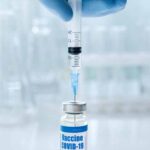PHILADELPHIA—Since March 2020, the world has been turned upside down by the COVID-19 pandemic. Rheumatologists must understand how to best protect and treat their patients with autoimmune conditions at risk for infection due to immunosuppressive therapy. At ACR Convergence 2022, the session titled, Latest COVID and Rheumatic Disease Therapies: What You Need to Know, provided a helpful review of this essential clinical topic.
Guidance
The first speaker was Rachael Perritt, PharmD, BCPS, clinical pharmacy specialist (ambulatory) at Penn Medicine, University of Pennsylvania Health System, Philadelphia. Dr. Perritt began her presentation by noting that patients with rheumatic diseases are at increased risk of developing—and dying from—COVID-19, compared with the general population. Specific risk factors for infection and death include being male; being age 65 or older; and having moderate to high rheumatic disease activity, hypertension or other cardiovascular diseases, and chronic lung diseases.
Dr. Perritt also noted that certain immunosuppressive medications, such as rituximab, sulfasalazine and glucocorticoids prescribed at more than 10 mg per day, have been shown to increase the risk of death from COVID-19. Many clinicians are surprised to see sulfasalazine on this list. She said this finding may be due to the characteristics of patients who are recommended for treatment with sulfasalazine (i.e., patients perceived to have higher baseline risk of infection may be preferentially treated with sulfasalazine over other disease-modifying anti-rheumatic drugs [DMARDs], and thus, these patients are more likely to experience severe COVID-19 disease).
Dr. Perritt also summarized general guidance from the ACR with respect to treating patients in the era of COVID-19, such as recommending social distancing, reducing in-person healthcare encounters when possible and using the lowest possible dose of glucocorticoids.
Vaccination against COVID-19 is clearly recommended for all patients and their family members, and patients should seek vaccination when disease is quiescent.
Dr. Perritt made reference to the ACR COVID-19 Vaccine Clinical Guidance Summary for Patients with Rheumatic and Musculoskeletal Diseases, which provides detailed recommendations for many immunosuppressive treatments and how these should be handled relative to timing of vaccination.1 In particular, Dr. Perritt explained, for patients to be treated with rituximab, it is ideal to perform vaccination against COVID-19 at least two to four weeks before rituximab dosing.
On this topic, it is worth stating that pre-exposure prophylaxis with tixagevimab and cilgevimab is indicated for patients who are moderately to severely immunocompromised and may not mount an immune response to COVID-19 vaccination; this would include patients on treatment with rituximab. Treatment with tixagevimab and cilgevimab should be given at least two weeks after vaccination and should be repeated every six months.
With respect to treatment of acute SARS-CoV-2 infection, Paxlovid (nirmatrelvir/ritonavir) is frequently used: Patients should present for treatment within the first five days of symptom onset, and clinicians should be aware of the many drug interactions that this medication may have with other pharmacologic therapies. The University of Liverpool, United Kingdom, has created a website where doctors can check for such interactions.2
Dr. Perritt explained that molnupiravir is another treatment for acute SARS-CoV-2 infection, although variable effectiveness has been reported. A different treatment, bebtelovimab (a monoclonal antibody), is for patients who are not candidates for antiviral therapy, but many resistant strains of SARS-CoV-2 now exist, thereby reducing the overall effectiveness of this medication.
Dr. Perritt concluded her talk by predicting remdesivir will see increasing use in the outpatient setting in the years to come.
Therapies
The second lecturer in the session was Stephen Saw, PharmD, BCIDP, clinical pharmacy specialist (infectious diseases) at the Hospital of the University of Pennsylvania, Philadelphia. Dr. Saw provided an overview of the timeline related to use of interleukin-6 (IL-6) inhibition, glucocorticoids and Janus kinase inhibition in the treatment of patients with COVID-19.
On these topics, he first discussed the REMAP-CAP study, an international, multifactorial, adaptive platform trial that involved randomization of adult patients with COVID-19 (within 24 hours after starting organ support in the intensive care unit) to treatment with tocilizumab, sarilumab or standard care (i.e., the typical care being provided to patients with COVID-19 at each clinical site). The primary outcome evaluated was respiratory and cardiovascular organ support-free days.
In this study, both tocilizumab and sarilumab met the predefined criteria for efficacy, and an analysis of 90-day survival showed improved survival in the pooled IL-6 receptor antagonist groups, with a hazard ratio compared with the control group of 1.61 (95% confidence interval, 1.25 to 2.08).3
Dr. Saw went on to discuss the RECOVERY study, a controlled, open-label trial in which patients hospitalized with COVID-19 who were receiving a range of possible treatments were randomized to receive oral or intravenous dexamethasone at a dose of 6 mg once daily for up to 10 days or to receive usual care alone (i.e., the typical care that was being provided to patients with COVID-19 at that time). The primary outcome was 28-day mortality. In this study of more than 6,000 patients, the age-adjusted rate ratio of 28-day mortality was 0.83 when comparing the dexamethasone group to the standard of care group (95% confidence interval, 0.75 to 0.93; P<0.001).4 This reduced rate of 28-day mortality in the dexamethasone group was impressive, but Dr. Saw noted that some possible limitations of the study included subjective inclusion and exclusion criteria, and a heterogeneous patient population.
Finally, Dr. Saw summarized the COV-BARRIER study, a phase 3, double-blind, randomized, placebo-controlled trial of hospitalized adults with COVID-19 receiving standard of care who were randomly assigned to receive once-daily baricitinib or matched placebo for up to 14 days. The primary end point was a composite of proportion of patients progressing to high-flow oxygen, non-invasive ventilation, invasive mechanical ventilation, or death by day 28, as assessed in the intention-to-treat population. In this study, no significant reduction in the frequency of disease progression overall was seen. However, treatment with baricitinib plus standard of care (including dexamethasone) was associated with reduced mortality, with one additional death prevented per 20 baricitinib-treated participants.5
In Sum
Overall, the session was enlightening on a number of COVID-related topics and helped present the state of the art on this theme. There will undoubtedly be much more to learn about this subject in coming years, but for now this session helped show clinicians around the country and the world what they need to know to best care for their patients with rheumatic disease in the setting of COVID-19.
Jason Liebowitz, MD, completed his fellowship in rheumatology at Johns Hopkins University, Baltimore, where he also earned his medical degree. He is currently in practice with Skylands Medical Group, N.J.
References
- Curtis JR, Johnson SR, Anthony DD, et al. American College of Rheumatology guidance for COVID-19 vaccination in patients with rheumatic and musculoskeletal diseases: Version 4. Arthritis Rheumatol. 2022 May;74(5):e21–e36.
- COVID-19 drug interactions. University of Liverpool. 2022.
- REMAP-CAP investigators, Gordon AC, Mouncey PR, et al. Interleukin-6 receptor antagonists in critically ill patients with COVID-19. N Engl J Med. 2021 Apr 22;384(16):1491–1502.
- RECOVERY Collaborative Group, Horby P, Lim WS, et al. Dexamethasone in hospitalized patients with COVID-19. N Engl J Med. 2021 Feb 25;384(8):693–704.
- Marconi VC, Ramanan AV, de Bono S, et al. Efficacy and safety of baricitinib for the treatment of hospitalised adults with COVID-19 (COV-BARRIER): A randomised, double-blind, parallel-group, placebo-controlled phase 3 trial Lancet Respir Med. 2021 Dec;9(12):1407–1418.




